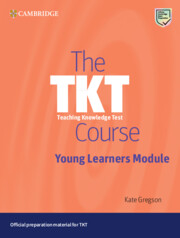Book contents
- Frontmatter
- Acknowledgements
- Contents
- Introduction
- Part 1 Knowledge of young learners and principles of teaching English to young learners
- Part 2 Planning and preparing young learner lessons
- Part 3 Teaching young learners
- Part 4 Assessing young learner learning in the classroom
- Follow-up activities: Answer keys and commentaries
- List of terms found in the TKT Glossary
- Glossary of TKT: Young Learners terms
- Test tips for TKT: Young Learners
- Teaching knowledge test young learners: Practice test
- Sample test answer sheet for TKT: YL practice test
- Answer key for TKT: YL practice test
Part 4 - Assessing young learner learning in the classroom
Published online by Cambridge University Press: 14 March 2024
- Frontmatter
- Acknowledgements
- Contents
- Introduction
- Part 1 Knowledge of young learners and principles of teaching English to young learners
- Part 2 Planning and preparing young learner lessons
- Part 3 Teaching young learners
- Part 4 Assessing young learner learning in the classroom
- Follow-up activities: Answer keys and commentaries
- List of terms found in the TKT Glossary
- Glossary of TKT: Young Learners terms
- Test tips for TKT: Young Learners
- Teaching knowledge test young learners: Practice test
- Sample test answer sheet for TKT: YL practice test
- Answer key for TKT: YL practice test
Summary
Part 4 will help you understand and use formative, classroom-based assessment activities to monitor and assess progress and achievement of learning. You will deepen your knowledge about purposes and focuses of different assessment strategies and think about ways in which teachers and learners may respond to the results of assessment. You will also consider ways in which we can assess learning and look in more detail at feedback given by teachers and learners. This part of The TKT Course: Young Learner Module will support your knowledge and skills in preparation for the fourth part of the TKT: YL module test: Assessing Young Learners. You can find more information in the TKT: YL syllabus in the module handbook, which is available online.
In the first unit of this part of the book, Unit 11, you’ll think about the purposes of different assessment types in teaching and learning. First, you’ll consider the use of the term ‘assessment’ and reflect on your interpretation of this term in response to reading about the formative assessment cycle. You’ll then look at different types of assessment appropriate for use with young learners and then consider how these may serve different purposes in teaching and learning.
Unit 12 turns to the focus of assessment: what to assess. This will consider areas we can assess in addition to language and language skills. The unit then looks at techniques for assessing these different areas and focuses on assessing non-language skills in the young learner context.
In Unit 13, you will look in more detail at the outcomes of assessment and the kinds of actions teachers or learners could take as a result of assessment outcomes. In the first section, we look at different ways teachers might adjust teaching and learning, based on assessment evidence. Then there is a focus on oral and written feedback before a closer look at using peer feedback with young learners.
At the end of each unit, there is a series of activities which will extend your learning, thinking and understanding, and help you explore and relate the unit theme to your own classroom practice or teaching context. These are followed by a set of TKT: YL practice questions based on the unit theme. It is recommended that you use your TKT: YL PD Journal to keep and organise your notes.
- Type
- Chapter
- Information
- The TKT Course Young Learners Module , pp. 116 - 117Publisher: Cambridge University PressPrint publication year: 2024



